Peter MALONE
Saturday, 18 September 2021 19:57
Journey of Natty Gann, The
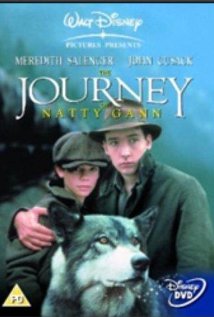
THE JOURNEY OF NATTY GANN
US, 1986, 101 minutes, Colour.
Meredith Salenger, John Cusack, Ray Wise, Lainie Kazan, Scatman Crothers, Barry Miller, Verna Bloom.
Directed by Jeremy Kagan.
The Journey of Natty Gann is a moving film for a family audience. It is set in the Depression, in 1935 – and won an Oscar nomination for costume design for the period.
Ray Wise portrays a widower, finding it difficult to get work, accused of being a Communist and a troublemaker, finally being offered a job on the other side of the US and having to leave his young daughter, writing a letter but unable to meet her before he left.
Meredith Salenger portrays Natty, the young daughter, feisty, fighting to defend her father’s name and the accusation of his being a Communist. She lives in the apartment block which is managed by a Lainie Kazan and befriends a man in the markets, played by Scatman Crothers.
She decides to go on a journey to the West Coast and the film shows is a great range of terrains and scenery, some beautiful, some plain, some isolated. Sometimes, she is told to get away, other times welcomed. She encounters a wide range of people on the way, meets with a snarling dog at a dogfight, actually, a wolf who becomes a companion.
She meets a young man, hitches a ride on a train, escaping notice because of the wolf, meeting up with him again and journeying the last section with him. He is played by John Cusack. She also meets a pregnant woman, Verna Bloom and tries to buy a train ticket but the seller refuses because of the wolf and rings the authorities. She also meets a group of young men and joins them, involved in stealing a cow from a farm, but then finds she is taken by the police and put in a reformatory, doing exercises in the yard, put in solitary confinement but held by a young girl to escape.
In the meantime, the father writes letters, phones and discovers she has gone, tries to get better jobs in order to end her. She approaches the office of the company and is turned away but the receptionist brings her information. She almost misses her father but is reunited with him road.
The film was directed by Jeremy Kagan, who had some successes in the 1970s and 1980s such films as Heroes and
1. A story of the Depression? The atmosphere of the 1930s? Employment and unemployment? Travel across the United States? The hard life?
2. The American city, apartments, jobs, difficulties in getting employment? The transition to Seattle? Working the timber industry? The journey going across the United States, the range of terrains, people, homes, hospitality, lack of hospitality? The musical score?
3. The title, the focus on Natty? Her age, experience? The death of her mother? Her love for her father, at home with him? His seeking the jobs, sometimes getting them, sometimes not? The fight with the kids, the accusation that he was a Commie, her fight? The offer of the job, his having go to the other side of the US, leaving the letter, entrusting her to Connie?
4. Connie, friendship with Natty’s father, the letters, her stern attitude, locking her up? Talking with a kind man at the market? Natty and her decision to go, out the window?
5. Natty’s character, using her wits, the different ways in which she travelled, getting lifts, the man and his molesting approach, wanting the wolf as a security dog? On the trains, meeting Harry, the difficulties and dangers? Coming across the dog fights, the wolf and his snarling, escape, following her, her befriending him, his support? Getting on the trains and his racing and leaping? His getting the rabbit, her skinning and cooking it, giving him the meat?
6. The kindly pregnant woman, her taking her in, the husband and his hostility, wanting to shoot the wolf?
7. The money, trying to buy a ticket, the guard, hostility to the wolf, phoning the authorities?
8. Her being taken in, the dormitories, the exercises in the yard, put in confinement, the young girl helping her to escape?
9. The group of young unemployed, the leader, attitude towards the wolf, their stealing the cow?
10. Her meeting Harry again, travelling, not going with him, his leaving on the bus, the bond with him?
11. The film interspersed with scenes of the father, his hard work, writing the letters, the phone calls, Connie, shocked that Natty had left? His volunteering for the difficult jobs, on the top of the tree? The dangers and explosions?
12. Natty going to the office, she in the wolf being rejected? Going to the forest, the wolf looking into the trees, her letting him go? The information about her father, the lift, seeing the vehicle go, her father in the back, chasing it – and his getting out and their being reunited?
13. Humane film, a film of difficult times, father and daughter, needs, enterprise, success and being reunited?
Published in Movie Reviews
Published in
Movie Reviews
Tagged under
Saturday, 18 September 2021 19:57
Beast of the City
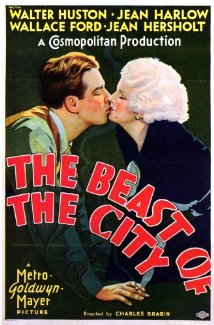
THE BEAST OF THE CITY
US, 1932, 86 minutes, Black and white.
Walter Huston, Jean Harlow, Wallace Ford, Jean Hersholt, Nat Pendleton, Mickey Rooney.
Directed by Charles Brabin.
The Beast of the title is the criminal element, embodied in criminals who feel they dominate a town – with memories of Al Capone and others.
This is a gangster and police film, in look and style and theme like something from Warner Brothers at this period. However, it is from MGM with MGM production values.
The film begins with a message from President Herbert Hoover, urging films not to glorify criminals but to glorify the hard work of the police. The central character is Jim Fitzpatrick, played by Walter Huston, a year before his Gabriel over the White House, another very political film of the period. He is hard, relentless, willing to beat confessions out of the accused but thwarted by lawyers and the criminals getting out on bail. On the other hand, he is presented at home as a genial father and husband – with Mickey Rooney appearing as his young son. His brother, also Detective, Ed, played by Wallace Ford, lives at home.
Fitzpatrick is demoted to a desk job but, after a bank robbery and his saving of a wounded man, he is in the headlines and it is decided to make him chief of police. He takes a hard but just line, singling out a squad to bring down the main criminal, played by the humanitarian Jean Hersholt. Jean Harlow, in an early role, is a gangsters moll. But, Ed is attracted to her and eventually persuaded by her to get some money by crooked means, allowing himself to be knocked out, thieves stealing a truck with money in it, but chased by police who have been set up by Jim as backup and there is a chase, shootout, the death of one of the policeman (always worried by the media getting his name wrong or omitting it), and the death of a child.
The gangsters intimidate the jurors with thugs present at the trial, with the verdict of not guilty, and the disgusted comment by the judge.
Ed is ashamed of what he has done, approaches his brother, offers to confront the gangster, with the police following through – and an enormous shootout.
A morale booster but rather grim in its presentation of the dominance of gangsters as well as the difficulties in police work.
Some of the photography is very skilful – for instance, some Robert Alteman-like sequences in the police corridor where the camera moves from one group to another and back. The director is an Englishman, Charles Brabin.
1. A film of 1932, of the Depression, of the Prohibition, of speakeasies, of gangsters, of the role of the police?
2. Black-and-white photography, an MGM film in the Warner Brothers vein? Musical score?
3. The prologue, the comment on the proliferation of the gangster films, the allegation that gangsters were glorified, the need for glorifying police and their police work, to eliminate the criminals? The quote from President Herbert Hoover?
4. The picture of the police, Jim Fitzpatrick and his work, relentless, raids, arrests, the criminals taken in, their lawyers, arguing for bail, the lack of hard evidence, having to let the criminals go? Fitzpatrick, his loyal friends, the support of his brother? The police chief, the Mayor and elections?
5. The character of Jim, strong, family man, loving his wife, with the twins, with the boy, with his brother at home, the comedy with the pancakes? His humane face at home? The letter arriving, his being transferred to a desk? The reaction of his wife, her support, having to move?
6. His work, at the desk, the small cases, the visit of his friends, the news of the bank robbery, the chase, the wreckage along the way, the pursuit of the criminals, shooting one, the rescue of the wounded policeman? Headlines?
7. His being promoted, his oath, his awkward speech, not used to broadcasting?
8. The meeting with the men, the big squad, his firm principles? His setting up a squad to get Sam Bellmonte? His relationship with his brother, the strong bond, his brother wanting a promotion, Jim telling him he had to earn it?
9. Ed, at home, unmarried, the encounter with Daisy, interrogation, drinking, falling in love, the outings? Her background, prison, in the lineup, her interview with the police? Stenographer, on the payroll of Belmonte? Leading Ed on? Wanting to go to Paris, urging him to go? The need for money? Tempting him with the job, the authorities having confidence in him, supervising the transfer? The setup, the two men, knocking him out, taking the truck? Jim having put to police on the tail? The chase, the shooting of the child? The policeman shot? The arrests?
10. Their being brought in, Jim and his disgust?
11. In court, Ed saying he couldn’t remember? The lawyer on the payroll, his melodramatics in the interrogation, his plea to the jury, the thug sitting in the hall and menacing the jury? Their verdict of not guilty? The judge and his disappointment and reprimand?
12. Jim, his regrets? Ed coming to see him, Ed’s change of heart? The idea, his going to the club, the confrontation with Belmonte? The police with him, the volunteers, the guns, the risks in the shootout?
13. Ed going to Belmonte, the confrontation, Jim’s arrival? Getting the guests out of the club? Ed taken hostage, being shot by Belmonte? Gunfight breaking out, Daisy being shot? The deaths on both sides in such a shootout?
14. An unexpected ending, the heroics, on the side of the law, to get rid of the criminals, to not have them dominating town? Morale boosting at the beginning of the 1930s?
Published in Movie Reviews
Published in
Movie Reviews
Tagged under
Saturday, 18 September 2021 19:57
Kid Nightingale
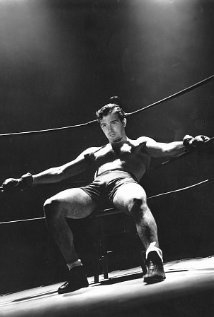
KID NIGHTINGALE
As, 1938, 62 minutes, Black and white.
John Payne, Jane Wyman, Edward Brophy, Walter Catlett.
Directed by George Amy.
Kid Nightingale is a brief programmer from Warner Brothers in 1938. It runs just over an hour. It is something of a fantasy, but it grows on its audience and is quite entertaining in its way.
It is both a boxing and a musical film. It starts of off with the boxing, the two rival managers and their clashes, and their contact with a talent scout, Skip Davis, Walter Catlett doing his bungling, comedic thing. There are some amusing sequences where Skip tries out with a hopeless boxer, one of the entrepreneurs is continually taking bicarbonate of soda, and the other is a schemer.
When Skip, despondent, goes to a restaurant, he sees a singing waiter who becomes involved in a fight and uses his fists – and is sacked. Skip decides that this man is the next best thing, sells the waiters car so that they can travel to New York and Skip tries to persuade both entrepreneurs, is given the chance for the singer to demonstrate and, by chance, he does a knockout. The singing waiter is played by John Payne, at the beginning of his career, later to appear in Fox musicals and, in the 1950s, in many action features. He also comes across a pianist, played with enthusiasm by Jane Wyman.
A scheme is hatched whereby Payne is publicised as attractive to women who flock to his bouts. His opponents are generally losers or are paid to lose and the young man’s reputation spreads. However, the main thing he wants to do is to meet a singing impresario and have lessons so that he can sing opera. And Jane Wyman would like to have music lessons from the same instructor. To keep their boxer under control, the entrepreneurs get a wrestler who resembles the impresario to impersonate him, who has quite a way with words and persuasion, reassuring the boxer.
Ultimately, everybody is to make money when he loses a championship bout, but Jane Wyman gets the real impresario to attend the boxing match, commenting on the boxer’s rhythm and agility with his feet, but then notices the impersonator across the ring. There is some chaos when there is a mutual knockout but the singer is persuaded to stand up and wins, all the entrepreneurs losing money because they bet against him – but singing lessons are in the offing and, of course, romance.
A small comedy which is much more entertaining than it might sound.
Published in Movie Reviews
Published in
Movie Reviews
Tagged under
Saturday, 18 September 2021 19:57
Battle Royale
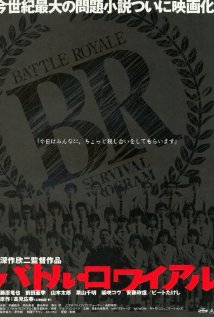
BATTLE ROYALE
Japan, 2000, 115 minutes, Colour.
Directed by Kinji Fukasaku.
Battle Royale is a drama about a futuristic Japanese society. Laws have been passed to control children, especially those of school-age. A system has been set up, Battle Royale, whereby children, supervised, have to fight each to the death. The film opens with acclamation for a young girl who has survived such a battle. the film also opens with some hard sequences, especially a young boy coming home to find that his father has hanged himself. There is also a sequence with teacher tries to control his class, but is wounded by a student with a knife, resigns and disappears from the school. The atmosphere is one of chaos.
The presence of Takeshi Kitano as the schoolteacher gives an indication about the treatment of the topic, direct, quite violent and in thematic and visual terms with the touch of satiric comment about society.
Most of the film is a graphic presentation of a Japanese version of The Hunger Games, where every child is given a number, equipment and weapons to survive, and each child has a neck brace which indicates to the authorities where the child is – with the information that if the child defies authorities, the neck brace can be exploded
It is Kitani who is the supervising teacher. It seems to give him the opportunity for some kind of vengeance against the students. They are taken by bus to an isolated island, drugged, awakening to find themselves with the neck brace, some instantly rebellious and killed. Many of the students are friends and embrace before the games but soon they are all. Information and details of eliminations are posted and the whole process is to last three days until only one student is left.
The bulk of the film has the students tracking each other, assaulting each other, trying to evade being killed, brutally slain, moments of betrayal, some touches of heroism, but a growing death list.
At the end, three students do survive with their own dreams, visualised. Kitano is present at the end of the games but it is attacked and killed. The film is a challenge to Japanese audiences about their and society, the role of children, education, discipline, means of control – and enacting of brutal laws in fascist future. The film was so successful that a sequel ensued, Battle Royale II.
Published in Movie Reviews
Published in
Movie Reviews
Tagged under
Saturday, 18 September 2021 19:57
Case of the Lucky Legs, The
THE CASE OF THE LUCKY LEGS
US, 1935, 77 minutes, Black and white.
Warren William, Timothy Tobin, Patricia Ellis, Lyle Talbot, Allen Jenkins, Barton Mc Laine, Porter Hall, Henry O’ Neill.
Directed by Archie. L. Mayo.
This is Perry Mason story from a novel by Earl Stanley Gardner. Warren William starred in a series of four small-budget films in the mid 1930s as Perry Mason, with Genevieve Tobin as Della Street.
For audiences accustomed to imagining Perry Mason like Raymond Burr and Della Street like Barbara Hale, the last film in the series will be something of a shock - marriage.
Warren William, romantic hero in some of the 1930s films, although also capable of being a suave villain, is tall and thin. He is also something of a comedian, as a character, in the way William plays Perry Mason. We first came across him on his office floor, suffering from a hangover, trying to placate a potential client, with Della fussing about him although being in charge.
He doesn’t go to court but serves as a detective, even quicker than Sherlock Holmes in working out hypotheses and gathering the facts and acting on them, better than the police, as admitted by the district attorney, Henry O’Neill?, irritating the chief of police, Barton Mc Laine. He is always flirtatious with the ladies.
The film opens with a beauty competition with a rogue sponsoring the competition and then absconding with the money made from sponsorships. This is particularly irritating for the organiser, Porter Hall, who is also in love with the girl who wins the competition, going to Perry Mason to track her down as well as the culprit. By certain ironies and coincidences and Perry Mason acting on his detective instincts, he reveals that this man is actually the murderer.
Mason is aided by his own detective, Spuds, 1a hen-picked husband, played by Allen Jenkins.
There are a number of suspicious women, especially those were victimised by the competition, and a righteous doctor who was in love with the winner of the competition but strenuously disapproved of her participating – and it is his instrument that is the murder weapon.
In the short running time, there are a number of incidents and plot, with Mason enjoying himself, carrying on really, more than a touch of the smug, and, of course, living to solve another case.
The other films in the series were The Case of the Howling Dog, The Case of the Curious Bride, The Case of the Velvet Claws – in which Perry Mason and Della Street marry!
US, 1935, 77 minutes, Black and white.
Warren William, Timothy Tobin, Patricia Ellis, Lyle Talbot, Allen Jenkins, Barton Mc Laine, Porter Hall, Henry O’ Neill.
Directed by Archie. L. Mayo.
This is Perry Mason story from a novel by Earl Stanley Gardner. Warren William starred in a series of four small-budget films in the mid 1930s as Perry Mason, with Genevieve Tobin as Della Street.
For audiences accustomed to imagining Perry Mason like Raymond Burr and Della Street like Barbara Hale, the last film in the series will be something of a shock - marriage.
Warren William, romantic hero in some of the 1930s films, although also capable of being a suave villain, is tall and thin. He is also something of a comedian, as a character, in the way William plays Perry Mason. We first came across him on his office floor, suffering from a hangover, trying to placate a potential client, with Della fussing about him although being in charge.
He doesn’t go to court but serves as a detective, even quicker than Sherlock Holmes in working out hypotheses and gathering the facts and acting on them, better than the police, as admitted by the district attorney, Henry O’Neill?, irritating the chief of police, Barton Mc Laine. He is always flirtatious with the ladies.
The film opens with a beauty competition with a rogue sponsoring the competition and then absconding with the money made from sponsorships. This is particularly irritating for the organiser, Porter Hall, who is also in love with the girl who wins the competition, going to Perry Mason to track her down as well as the culprit. By certain ironies and coincidences and Perry Mason acting on his detective instincts, he reveals that this man is actually the murderer.
Mason is aided by his own detective, Spuds, 1a hen-picked husband, played by Allen Jenkins.
There are a number of suspicious women, especially those were victimised by the competition, and a righteous doctor who was in love with the winner of the competition but strenuously disapproved of her participating – and it is his instrument that is the murder weapon.
In the short running time, there are a number of incidents and plot, with Mason enjoying himself, carrying on really, more than a touch of the smug, and, of course, living to solve another case.
The other films in the series were The Case of the Howling Dog, The Case of the Curious Bride, The Case of the Velvet Claws – in which Perry Mason and Della Street marry!
Published in Movie Reviews
Published in
Movie Reviews
Tagged under
Saturday, 18 September 2021 19:57
Simone
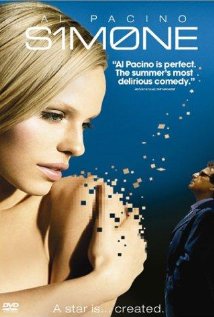
SIMONE
US, 2002, 117 minutes, Colour.
Al Pacino, Catherine Keener, Winona Ryder, Jay Mohr, Evan Rachel Wood, Rachel Roberts, Pruitt Taylor Vince, Daniel von Bargen, Elias Koteas.
Directed by Andrew Niccol.
New Zealand-born, Andrew Niccol, had a very successful year in 1998. He directed a stylish futuristic thriller, Gattaca, which explored a totalitarian state and need for a rebel. He also wrote the screenplay for Peter Weir's The Truman Show where Jim Carrey's Truman Burbank had been an unwitting celebrity in his own reality show since he was born. The television producer, played by Ed Harris, 'played God' with Truman's life, controlling his every mood and action in every situation.
It is not a huge step to his screenplay for Simone, which he has also directed. He stays with the world of movies and television and the public's need for celebrity and its craving for entertainment glitz.
Al Pacino portrays a successful television producer who has troubles with his temperamental star (Winona Ryder). But a bequest from a mad scientist enables him to use his theories to create his own digital star (who is played by an actual actress, Rachel Roberts), Simone (S1mOne).
Simone is a construct, as is the movie we watch. We assume all kinds of things in movie-making. We know that computergraphics can reproduce huge armies for Braveheart and a Colisseum full of Roman spectators for Gladiator. But, what is the effect on the audience? So, what if the star exists only in a computer-controlled machine, appearing, lifelife, on a computer-controlled screen. It is fun to watch the stupidities of pragmatic producers like Pacino's wife (Catherine Keener), desperate to meet and be associated with Simone.
Fans swoon at her concerts and would swear that they saw her. She even receives two Oscars.
Niccol has given us an entertaining fantasy and satire about the tensions between our craving for reality and our idolizing of technology.
1. 21st century technology? Virtual reality? Serious themes? Satiric tone?
2. The writer-director and his interests, science fiction, the media? The strong cast?
3. The picture of Hollywood production, directors and producers, volatility, egos, publicity, agents? The studios and filming? Media jobs? Deception?
4. The scientist and his invention, madness, his interest in Victor, his bequest, his death? The information, Victor’s response? His grave?
5. The situation, filming, Victor’s reputation, his wife as producer, his relationship with his daughter? The star and her tantrum, the scenes, firing her? The potential failure for the film? Her later coming back to Victor?
6. Victor’s character, his age, experience, in Hollywood, production, direction, obsessed? Difficulties, falling box office, studio pressures? His relationships?
7. His experience, the gift, working on his computer, the discovery of the possibilities for simulation? His decision to create Simone? The scenes of simulation, her name, the technical aspects, seeing her picture on screen, her movement, characteristics and beauty, her voice, Victor and his manipulation?
8. The idea of making a film with Simone, the other members of the cast, Hal Sinclair and acting with the creation, yet his creating a story, his relationship, pretending that he knew Simone? Victor and his creating the character, her performance, publicity effect?
9. Continuing the pretence, the response of the studio, his forbidding entry into the production studio, the role of the security guard? His wife, her enthusiasm, eagerness to meet Simone? The dangers for Victor? Finishing the film?
10. Max Sayer, his investigations, probes? Wanting an expose? His infatuation with Simone?
11. Victor and his continued pretence, sightings of Simone, setting up the hotel room as if she was there, the visual interviews and his mouthing her words? The continued excuses, the fans and their enthusiasm?
12. His creating a back story for Simone, her seclusion, different appearances, doubles, rumours, the limousines?
13. Hollywood life, gossip about Simone, the magazines, the clips, Victors voice, her physical effects? Her films, the performances, the praise?
14. The Oscar nominations, the ironyies, the Academy affirming a complete construction?
15. Victor, his relationship with his daughter, her questions, ferreting out the truth, the response of his wife?
16. The end, Victor and his achievement, the end of Simone? But not the end of virtual creativity?
17. The effect, the challenge to the media, reality and unreality, virtual reality, the world of the hype?
Published in Movie Reviews
Published in
Movie Reviews
Tagged under
Saturday, 18 September 2021 19:57
Arsene Lupin Returns
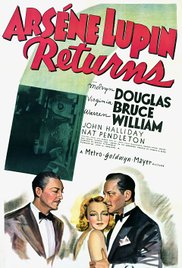
ARSENE LUPIN RETURNS
US, 1938, 81 minutes, Black and white.
Melvyn Douglas, Warren William, Virginia Bruce, John Halliday, Nat Pendleton, Monty Wooley, E. E. Clive, George Zucco, Vladimir Sokoloff.
Directed by Geo Fitzmaurice.
Arsene Lupin is an entertaining detective story. Arsene Lupin is a classic character from French literature – and there were films at the beginning of the 21st century from France (with Romain Duris and Kristin Scott Thomas) with him is the central character.
This is a small budget film, a supporting feature at MGM, with Warren William as a strong lead of the 1930s, even as Perry Mason, and Melvyn Douglas emerging as a star and to continue in films for the next 40 years, winning two best supporting actor Oscars for Hud and for Being There.
The supporting cast is interesting, including eccentric comedian Monty Woolley as the ultimate villain, British E. E. Clive as a criminal associate, along with the dumb-ox character actor, Nat Pendleton. George Zucco is girl is the police chief and Virginia Bruce the heroine.
The plot involves the theft of a jewel pendant, its copy, the use of French bullets and a gun, insurance problems, moving from New York to Paris, Melvyn Douglas as Rene a romantic lead but really Arsene Lupin, reformed, so that he can marry Virginia Bruce. The mystery is solved by the two men working together.
The film was directed by Geo Fitzmaurice, director of a number of films from the late 1920s throughout the 1930s.
1. A popular mystery? The tradition of the Arsene Lupin stories? And in later decades?
2. MGM production values, 1930s style, the cast, the director? The New York settings, the Paris settings? Interiors? Musical score?
3. The focus on Steve Emerson, the G-man, confrontating criminals, arrests, his reputation, the acclaim of the staff, meeting the chief, the chief complaining that his photos were everywhere, the criminals knowing who he was, that the police were not an advertising agency? His being sacked? His having the other job, protecting the jewels?
4. Going to the hotel, warning for the jewel to be kept in the safe, his meeting The count, Bouchet, Lorraine, the Arsene Lupin note, the bullet, his retrieving it, getting the authority to examine it and identify it, the gun? his pocketing the note?
5. The return to Paris? the boat, the group returning, René and the dogs, the greetings?
6. The insurer and situation, the advice to return to Paris, the limited number of days, the plan for the robbery, the insurance?
7. René, his associates, his past as Arsene Lupin, the change, his wanting to marry, his nonviolence? suave manner? Steve and his suspicions? The two former henchman?
8. The socialising, René and Lorraine, Steve and his interest?
9. The criminal, the attempt on the jewels? the police and the investigation, declaring that Arsene Lupin was dead?
10. The death of the criminal? suspicions?
11. Everybody gathering together, the explanation, Bouchet and his debts, getting the gun, his arrest? the relief for Lorraine and her uncle?
12. The pleasant work of the two men together, Steve knowing the truth, René and his revealing the truth, and signing the autograph – with Steve tearing it up? and happy romantic ending?
Published in Movie Reviews
Published in
Movie Reviews
Tagged under
Saturday, 18 September 2021 19:57
Histoire de fou, Une/ Don't Tell Me the Boy is Mad

UNE HISTOIRE DE FOU/ DON'T TELL ME THE BOY IS MAD
Friends, 2015, 134 minutes, Colour.
Ariane Ascaride, Syrus ShahidI Gregoire Leprince- Ringuet, Simon Abkarian.
Directed by Robert Guediguian.
This film has two titles with quite different emphases. The French title is very straightforward, highlighting history, highlighting madness, the madness of political violence and its consequences. On the other hand, the English title is a quotation from a popular song which is referred to during the film. While the lyric does have some reference to the young terrorist at the centre of the film, it is not as powerful a title as the History of Madness.
This is a film by Robert Guediguian, one of the celebrated French directors of the last decades of the 20th century and into the 21st century, a very strong history of dramas, capitalising on the atmosphere of his Marseille, the characters who live there, especially those of Armenian descent as he is. His Snows of Kilimanjaro is particularly recommended. He always works with his wife Ariane Ascaride in his films. In his film about Armenians fighting for the French in World War II, Army of Crime, the lead is Simon Abkarian who is also the father in this film.
The opening highlights the attitude of Armenians towards the genocide by the Turks in 1915, subject of a number of films including the Taviani Brothers’ The Lark Farm. A historic sequence serves as a prologue, a young Armenian mingles with a crowd, a Turkish official speaking.The man draws a gun and shoots him. He is overpowered, arrested, and tried in the courts and found guilty. However, he becomes a hero-figure, an ideals icon, a visual icon of the struggle of Armenians against the Turks and the continued resentments.
The main action takes place in the 1980s. There is a group of young people in the city of Marseille, inspired by the ideology of the assassin, planning attacks on Turks, including an assassination attempt on the ambassador on a visit to Marseilles. The young man at the centre of the film, Aram, is caught up in the feelings, despite the stern attitude of his father who is in favour of peace, running a supply store in the city, the man well respected by his clients, father of the family, with a devoted wife. However, he is a strong traditionalist, keeping order in his household.
The key scene of the film is the assassination attempt on the Turkish ambassador with Aram present and ready to pull the trigger. The dramatic complication is that as has to fire, a young French student cycles past and his court in the line of fire, severely injured. Aram’s parents are shocked by the news headlines, and their son flees to Lebanon where he joins a terrorist training group, led by a martial leader, who is particularly egocentric and fanatical, exercising his power and ideology over the group – though some rebel and even Aram decides to leave.
This part of the film focuses on anger, memory, resentment, vengeance.
Then the film shifts in tone, the mother deciding to go secretly to the hospital to visit the young Frenchman who has been injured, who is undergoing physiotherapy, has his own deep resentments and cannot relate well to his girlfriend or her family.
As he recovers, the Frenchman decides to go to Marseilles and visit the mother, where, after some hesitation, he is brought into the family, living with the family, working with the father in the store, meeting the clients, gradually working through his hatreds and moving towards some kind of hope and rehabilitation.
The mother and the Frenchman decide that they need to go to Beirut to meet with Aram. They do and there is some kind of apology, forgiveness, reconciliation.
The film does not end easily, more violence ensues. However, this is a strong film about wars, genocides, harsh memories, decades old resentments, outbursts of violence and acts of terrorism, but by the end, it is quite a noble film, with the best aspirations of forgiveness, reconciliation and hope.
Well worth seeing.
1. A strong French film about Armenian migrants in France, the history of Armenia in the early 20th century, the genocide and its consequences? Feeling against Turkey? Acts of terrorism and assassinations? The 1980s, use of terrorist acts, revenge?
2. The director, French, his Armenian heritage? His continued interest in Armenian themes? The focus on Marseille, life in the city, the Armenian population?
3. The city of Marseille, the city itself, homes, shops, the streets? The contrast with Beirut? War, occupation, slums, the apartments, destruction? Lebanon and the training camps for the Armenians? The musical score?
4. The title, the history of madness? The English title, the songs, the lyrics? The Armenian memory, vengeance, the film indicating much of the futility of this kind of vengeance? The importance of forgiveness, reconciliation and hope? Positive building?
5. The prologue, the background of the genocide, the crowds, the focus on the assassin, the Turkish authority, his being killed? The arrest, the court case, the condemnation of the assassin? The images, his becoming an icon, a hero? Later commemorations of his assassin attack?
6. The 1980s, Marseille, the focus on the family, the father, a serious man, touch of the patriarch, the importance of his shop, the goods? His being stern, his interactions with his customers? The range of Armenian French customers? The mother, love for her children, supportive of her husband? The traditions of the house? The memories? The effect on the family?
7. Aram, his role as son and the family, his age? The background, memories of the genocide, the people influencing him in Marseille, and involvement in the protests, his leaving, the assassination attempt, the Frenchman on his bike, Aram and his hesitation, motives, continuing with the assassination of the Turkish official? His escape, going to Beirut? His involvement with the group, the demands of the leader, the details of the training? The leader, his exercise of power, becoming more fanatical, his demands on the men, the effect on them, the effect on ram, and issues of loyalty, ideology? In action, the individuals rebelling against the leader, the old veteran? Aram and his decision to leave?
8. The newspaper headlines, the effect, the response of the parents to the assassination, tensions?
9. Gilles, ordinary Frenchman, his background, studies, relationship, his girlfriend’s family, his own family? The injuries, the visit of the girlfriend, his sense of distance? In hospital, the physiotherapy, his growing resentments?
10. Aram’s mother, her decision to visit the hospital, her motivation, seeing Gilles and his negative reaction, the effect? Her husband’s puzzle, telling him what happened?
11. Gilles, on the road to recovery, his coming to Marseilles, meeting the mother, the father, the children, the response? His being welcomed? His decision to stay, his room and the difficulties in getting up the stairs, the meals, but becoming part of the life of the family, with each of the members, with the clients in the store, and experience of reparation, his becoming a new son to the couple?
12. His girlfriend, her family, their puzzle, her visit and his reaction?
13. The mother, wanting to go to Lebanon, Gilles wanting to go to Lebanon, both having a need to see Aram? The phone calls, the friends in Marseille, the links, the terrorist group, contacting Aram? The flight, arrival, the quarters of the city, the destruction? Aram and the setup, trying to avoid the fanatic leader? The meeting, the upper room, the apology and its effect?
14. The leader, the ambush of Aram, the attack, the shooting, his mother and her grief?
15. Returning to Marseilles, the father and his sadness and dignity, the mother and her grief?
16. A film highlighting the intensity of patriotism, historic resentments, the need for revenge, idealising heroes, assassinations, by-products of violence? The issues in the thrust of the film to forgiveness, reconciliation, hope?
Published in Movie Reviews
Published in
Movie Reviews
Tagged under
Saturday, 18 September 2021 19:57
Pasolini
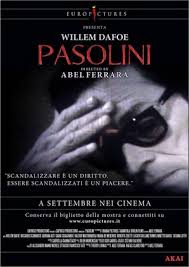
PASOLINI
Italy, 2014, 80 minutes, Colour.
Willem Dafoe, Ninetto Davoli, Raccardo Scarmaccio, Adrian Asti, Maria de Medeiros.
Directed by Abel Ferrara.
For audiences expecting some kind of conspiracy theory about the life and death of novelist, poet, filmmaker, Pier Paolo Pasolini, this is not the film. There have been other films and many a documentary speculating on the political interventions that caused the death of the famed director. Here, Abel Ferrara sees his film as an “unconspiracy”.
While the film traces the last day of Pasolini’s life, it ranges well into the past, has clips from some of his work, especially from Salo and readings from his essays and novels as well as a dramatising of his novel and a character who is his alter ego.
William Dafoe portrays the director, an interesting performance, sometimes using English, sometimes using Italian – and the characters in the film moving from one language to another, though it is basically in Italian.
There is the ordinary life of Pasolini, at home with his mother, the meals, reading, discussions with film people, friends. There is also a sense of realism about his homosexual orientation, his personal behaviour, his alter ego picking up young men, a focus on the kind of young men who are rent boys, leading to the murder of Pasolini on the beach at Ostia.
In the film, playing a significant role of a guide, is the actor, Ninetto Davoli, who appeared in so many of Pasolini’s films and was one of his companions in real life.
The film requires closer attention than usual because of its moving from one style to another, from realism to imagination and story, to an emphasis on dialogue and reading of texts to personal interactions.
One might see it as an interesting contribution to the continuing discussions about Pasolini, his outspokenness, his criticism of government and Italian culture and society, his writings, his films and his significance in Italy in the 1960s and 1970s.
1. Audience knowledge of Pasolini? As a writer, novelist, poet, film director? His political stances? As a person? His homosexuality?
2. Abel Ferrara and his career? Small budget American films? The dark side? His Italian background, sensibilities? This film as an Italian production with European money?
3. Pasolini’s death, speculation, conspiracy theories, political background, the bashing of homosexuals? This film as ‘unconspiracy’? The director not being interested in how or why Pasolini was killed, simply lamenting the fact that the world had lost a genius?
4. The visual style, the sequences from Salo, impressionistic, light and dark, realism and fantasy, the use of close-ups – in the Pasolini style? The camera movements and editing?
5. The musical score, Italian, classical music, modern music, the Missa Luba?
6. The range of the screenplay, the portrait of Pasolini, as an interpretation, the use of his verbal texts, the scenes from Salo and the issues of politics and sex? Quotes from Pasolini, his novels? The visualising of his novel, its relationship to him, and his narration? The behaviour of his alter ego, with the young man on the outskirts of Rome? Going to the discussion about the narrative? The narrative, the story of the crash and its visualising? The relevant fantasy, the star of the Messiah, memories of the Gospel according to St Matthew? The naturalism, the ordinariness of the scenes of Pasolini’s home, his mother, secretary, reading the paper, work? At the trattoria, the young man, the meal? His death? The camera circling, returning to his dead body? The aftermath at home, with two men following the star – and the cynical response?
7. Willem Dafoe as Pasolini, his appearance, gaunt, the glasses? The scenes from Salo, the interview, his work as a director? Speaking French, Italian, in English and his American accent?
8. The issue of homosexuality, his orientation, his alter ego and the encounter and sexual behaviour with the men? The casting of Ninetto Davoli, part of Pasolini’s life and films? Nunzio and Epifanio, the character of Nunzio being performed by the Ninetto Davoli character? Searching for the star, the guards and there eyeing each other sexually, the orgy of gay and lesbians and procreation, the world of the rent boys, the experience, the bashing of homosexuals?
9. The realism, the interviews, at home, the meals, waking in the morning, love for his mother, the secretary and the appointments, the visit of Laura, the rent boys, the end?
10. The issue of narrative and the relationship to the narrator, the alter ego, listening, the story of the plane, its crash?
11. The meal with the couple, Davoli, the mother, Pasolini and the baby?
12. The fantasy with it be Epifanio and Nunzio, Ninetto Davoli and his history, the journey, the star, the guards, the sexual looks, the guide, going into the
orgy, the star appearing from the fireworks, following the star, the narration that there was no paradise, no end, the couple, Epifanio looking back at the earth, understanding the earth, the value of the journey in the search, nothing to do but wait?
13. An impressionistic look at the last day of Pasolini’s life, his activities, his imagination, the grief of his mother, the secretary and Laura – and looking at
the date in his diary for the day of his death?
14. Insights? Impressions?
Published in Movie Reviews
Published in
Movie Reviews
Tagged under
Saturday, 18 September 2021 19:57
Results
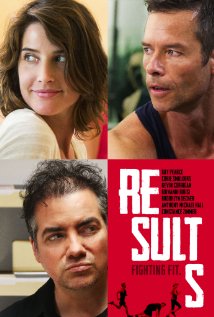
RESULTS
US, 2015, 105 minutes, Colour.
Guy Pearce, Cobie Smulders, Kevin Corrigan, Giovanni Ribisi, Brooklyn Decker, Anthony Michael Hall, Constance Zimmer, Elizabeth Berridge.
Directed by Andrew Bujalski.
What to expect from results?
This is an offbeat Texas comedy drama from Andrew Bujalski, an experimental kind of director who made an impact with Computer Chess.
In this one, Trevor, Guy Pearce, allowed to be an Australian, runs a gym in Austin, with quite a wide range of clients. One of his key trainers is Kat played by Cobie Smulders, who has had a relationship with Trevor in the past. She keeps fit, but varies in her moods.
Enter Daniel, an interesting performance by Kevin Corrigan, who wants to be fit but really needs a good psychiatrist as well, separated from his wife, with a big inheritance from his divorced wife, able to buy whatever he wants, and falling in love with the trainer.
There are quite a lot of oddball situations, with Guy Pearce having to deal with all kinds of problems but also ambitious, planning an extended gym and progressing with its building.
And the tangles with Kat and with Daniel, Trevor tries to keep a sane perspective on things – but does go on a trip to see a fitness guru that he admires – played by Anthony Michael Hall – who is not quite the guru that he imagined!
Which means then that to get results, one should use one’s ordinary gifts and utilise one’s common sense!
1. An offbeat comedy about people? The writer-director, his story and perspective?
2. A Texas story? Austin? A Texas mentality? The world of trainers and clients? Offices, courses, exercises? Interviews, accounts? The philosophy of Power 4 You? The range of clients, some bizarre, the range of trainers? Dreams of expansion and hopes?
3. The philosophically of philosophy of the Power 4 Life, Trevor and his beliefs, others not sharing it in practice? The ideal versus the pragmatic and the cynical?
4. Guy Pearce as Trevor, an Australian character, his company, establishing it, building it for 10 years, his slogans, physical, psychological, emotional, spiritual? The clips on You Tube? His staff, the groups for exercises? His own personal training? Living alone, his companionship with the dog? The revelation that he had a daughter? The past relationship with Kat? The agent for buying the building, the sexual relationship? How credible character?
5. Kat, a trainer, her continued running, uptight? Her appearance, called? Angers? Relationships, clients, confronting the woman who had not paid? The clips on You Tube? the past with Trevor, critical of him? Training the fat man who just wanted to stop, her quitting? The encounter with Daniel, the initial meeting, the possibilities, positions, the interview, his photographing his food, the growing involvement, the exercises, smoking pot, the sexual encounter, watching the television and the program on mental health? The effect on her, Daniel’s lavish dinner and the musicians, storming out, her anger? Threat of the law?
6. Daniel, his wife, leaping up to the window sill, her shutting the window? His age, experience, not talking to his mother, her second marriage, becoming rich, her death? His inheriting after his divorce? His wealth, the lavish house, spending on what he wanted, wilful? His being bored and depressed? The initial interview with Trevor, wanting to take a punch? At home, the range of equipment? Kat, the food, photo of the pizza? His exercises, watching You Tube, the clip with Kat and her butt? His talk, his story? Pot, drinking? Paying the hundreds of dollars to fix his TV? The sexual encounter, infatuated with Kat? The dinner, lavish preparation, her anger? His stopping the cheque? The encounter with poor, the slacker lawyer, pot smoking, friend?
7. Trevor going to the new site, his dreams and imaginings for a new centre? The confrontation with Daniel, the threats? Defending Kat? The discussions about his affair? Discussions with Daniel, going inside, Paul, the drinking? Daniel and his financing the centre, the visit the plan? Paul and the documents, pressurising Trevor to sign? Daniel and his anger, ousting Trevor, refusing to take his calls? Selling his share cheaply to Kat?
8. The visit to the guru, the long drive, the man himself, the YouTube? clips, settle down, the younger wife, the meals, his not having ideals, the touch of the cynic, pragmatic, the discussion about the seminars, about perfection and bodies? Calls with Kat, speeding and the red light, the police? Her joining the meal, the plain talk? The gift of the dumbbells?
9. Kat and Trevor, the talk, the photos of his daughter, the sexual relationship? The possibilities for the future?
10. Daniel, the advice to go to the sorority, inviting the girls to the party?
11. The end, altogether happily dancing – what future?
Published in Movie Reviews
Published in
Movie Reviews
Tagged under